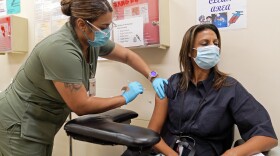
Rob Stein
Rob Stein is a correspondent and senior editor on NPR's science desk.
An award-winning science journalist with more than 30 years of experience, Stein mostly covers health and medicine. He tends to focus on stories that illustrate the intersection of science, health, politics, social trends, ethics, and federal science policy. He tracks genetics, stem cells, cancer research, women's health issues, and other science, medical, and health policy news.
Before NPR, Stein worked at The Washington Post for 16 years, first as the newspaper's science editor and then as a national health reporter. Earlier in his career, Stein spent about four years as an editor at NPR's science desk. Before that, he was a science reporter for United Press International (UPI) in Boston and the science editor of the international wire service in Washington.
Stein's work has been honored by many organizations, including the National Academy of Sciences, the American Association for the Advancement of Science, the American Association for Cancer Research, and the Association of Health Care Journalists. He was twice part of NPR teams that won Peabody Awards.
Stein frequently represents NPR, speaking at universities, international meetings and other venues, including the University of Cambridge in Britain, the World Conference of Science Journalists in South Korea, and the Aspen Institute in Washington, DC.
Stein is a graduate of the University of Massachusetts, Amherst. He completed a journalism fellowship at the Harvard School of Public Health, a program in science and religion at the University of Cambridge, and a summer science writer's workshop at the Marine Biological Laboratory in Woods Hole, Mass.
-
Colossal Biosciences says it used novel gene-editing technology to alter gray wolf DNA to breed the animals. Dire wolves recently featured prominently in the HBO series Game of Thrones.
-
Vaccines for a fall immunization drive against COVID-19 just got the green light from the Food and Drug Administration. The agency says the vaccines can protect people, as hospitalizations tick up.
-
In July, coronavirus infections, hospitalizations and emergency room visits have inched up. Recent summers have seen a bump in COVID-19. This year's rise looks modest so far.
-
The new approach would simplify vaccination guidance so that, every fall, people would get a new shot, updated to try to match whatever variant is dominant.
-
Step aside, BA.5. The new variants BQ.1 and BQ.1.1, appear to be among the most adept yet at evading immunity from previous infection and vaccination.
-
Here we go again. The virus is starting to surge in many European countries and there are early signs a wave may be starting in the U.S. too.
-
The COVID-19 vaccine strategy may be shifting toward Americans getting yearly vaccinations, like many do with annual flu shots.
-
CDC Director Rochelle Walensky has signed off on updated versions of the Moderna and Pfizer-BioNTech vaccines that target the original virus and the omicron subvariants.
-
The new shots from Moderna and Pfizer-BioNTech target both the original strain of the coronavirus and the omicron BA.4/BA.5 subvariants that most people are catching now.
-
The Food and Drug Administration is planning to authorize a new generation of COVID-19 boosters this week that for the first time will target the omicron variant.










